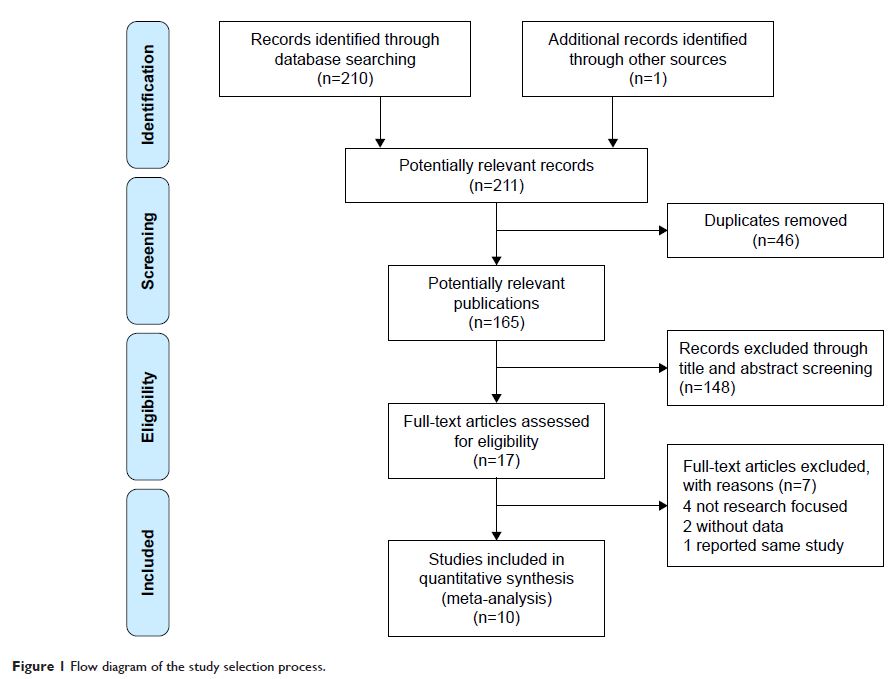108605
论文已发表
注册即可获取德孚的最新动态
IF 收录期刊
- 3.4 Breast Cancer (Dove Med Press)
- 3.2 Clin Epidemiol
- 2.6 Cancer Manag Res
- 2.9 Infect Drug Resist
- 3.7 Clin Interv Aging
- 5.1 Drug Des Dev Ther
- 3.1 Int J Chronic Obstr
- 6.6 Int J Nanomed
- 2.6 Int J Women's Health
- 2.9 Neuropsych Dis Treat
- 2.8 OncoTargets Ther
- 2.0 Patient Prefer Adher
- 2.2 Ther Clin Risk Manag
- 2.5 J Pain Res
- 3.0 Diabet Metab Synd Ob
- 3.2 Psychol Res Behav Ma
- 3.4 Nat Sci Sleep
- 1.8 Pharmgenomics Pers Med
- 2.0 Risk Manag Healthc Policy
- 4.1 J Inflamm Res
- 2.0 Int J Gen Med
- 3.4 J Hepatocell Carcinoma
- 3.0 J Asthma Allergy
- 2.2 Clin Cosmet Investig Dermatol
- 2.4 J Multidiscip Healthc

BDNF rs6265 G> A 多态性与癫痫易感性的重要相关性:一项综合分析
Authors Xu Y, Li X, Zhuang S, Guo S, Xiang J, Wang L, Zhou L, Wu B
Received 23 October 2017
Accepted for publication 5 February 2018
Published 16 April 2018 Volume 2018:14 Pages 1035—1046
DOI https://doi.org/10.2147/NDT.S154927
Checked for plagiarism Yes
Review by Single-blind
Peer reviewers approved by Prof. Dr. Roumen Kirov
Peer reviewer comments 3
Editor who approved publication: Professor Wai Kwong Tang
Introduction: Previously published
articles have suggested that BDNF rs6265
G>A polymorphism is a potential risk factor for epilepsy. However, the
results were not consistent.
Methods: We conducted a meta-analysis to explore the
association between BDNF rs6265
G>A polymorphism and epilepsy risk. Four online databases were searched, and
related studies were reviewed from their inception up to June 20, 2017. ORs and
corresponding 95% CIs were used to calculate the associations of each genetic
model. Overall, 10 case–control publications involving 9,512 subjects were
included in this meta-analysis.
Results: Significant associations were found
between BDNF rs6265 G>A
polymorphism and epilepsy (A vs G: OR=0.88, 95% CI=0.83–0.94, P <0.01, I2=0%; GA vs GG: OR=0.88, 95% CI=0.79–0.97, P =0.01, I2=0%; AA vs GG: OR=0.79, 95% CI=0.70–0.90, P <0.01, I2=0%; GA+AA vs GG: OR=0.85, 95% CI=0.77–0.94, P <0.01, I2=0%; AA vs GG+GA: OR=0.85, 95% CI=0.76–0.95, P =0.01, I2=0%). Subgroup analysis also showed similar results
in an Asian population.
Conclusion: Our meta-analysis indicated that BDNF rs6265 G>A
polymorphism might be involved in epilepsy susceptibility, especially in the
Asian population.
Keywords: brain derived neurotrophic factor ,
epilepsy, seizure, polymorphism, variant, rs6265, case–control
